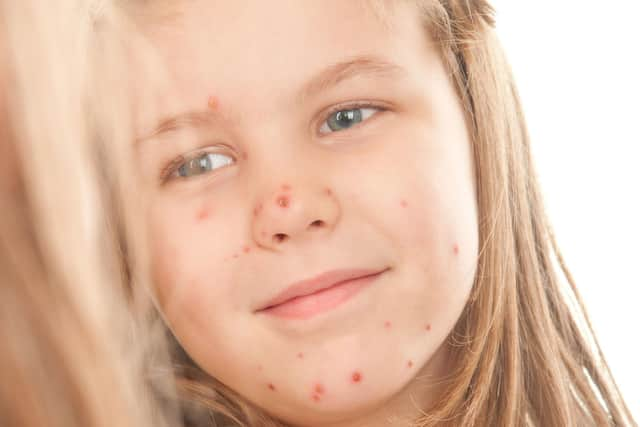Chicken pox outbreak in Lancashire - how Covid has affected cases and what to do if your child becomes ill
and live on Freeview channel 276
Although the illness spreads across UK schools and nurseries every year, over 2020 and 2021, the majority of chickenpox season - between March and May - has been over lockdowns or some form of social distancing rules.
This means that it has been difficult for the illness to spread throughout children, resulting in a large amount of children across the UK who are not yet immune.
>>>What are the symptoms of chickenpox? Click here.


Little Rascals in Fulwood is one nursery where there has been a rise in cases.
Advertisement
Hide AdAdvertisement
Hide AdA spokesman said: "We've definitely seen a rise in cases, but it hasn't affected us too much.
"We've put signs up across the nursery advising on not bringing in children who are ill and have symptoms, and have been referring parents to the NHS website."
>>>Click here to access the NHS guidance on chickenpox.
A spokesman for Bright Sparks nursery in Penwortham said: "We have heard that there is a rise in cases in the area, but we've only had one child with it in the last few weeks."
It is also known that there has been an outbreak in some primary schools in the South Ribble area, but Lancashire County Council does not hold figures as chicken pox is not a ‘notifiable disease’.
"More concerning"
A spokesman for Poplars Nursery in Leyland said: "We have heard on the grapevine that chickenpox is rife, but we've not had a massive rise, just the odd case.
"February/March is usually chickenpox season and we saw a lot of it last year, so a lot of our children will now have immunity.
Advertisement
Hide AdAdvertisement
Hide Ad"But more worryingly is the number of children we're seeing affected by RSV (Respiratory Syncytial Virus).
"Children start off coughing and it gets worse, and there's been a lot of children going into Ward 8 at hospital (Royal Preston Hospital’s children’s ward) with it.
"Children haven't built up their immunity in the past two years. We've wrapped them up in cotton wool, bleached everything, and we haven't seen anyone."
Doctors at the Royal Preston Hospital warned parents of a rise in hospital admissions for RSV late last year.
Advertisement
Hide AdAdvertisement
Hide AdBecause many under two’s have not been exposed to colds as much due to the previous lockdowns, Public Health England has been preparing for a higher than normal number of cases with potentially 50 per cent more hospital admissions than normal.
>>>To read more about RSV in Preston click here
Lancashire County Council, which looks after public health across the area part from in Blackpool and Blackburn with Darwen, said it doesn’t hold figures on cases of chickenpox.
But a spokesman for Blackpool Council said outbreaks were increasing across the country.
They said: “One of the consequences of the lessening of restrictions around Covid19 is that we are all now mixing more, and common infectious diseases such as chickenpox are spreading again in the community.
Advertisement
Hide AdAdvertisement
Hide Ad"In Blackpool, as in the rest of the country we are seeing an increase in cases with outbreaks reported in some childhood settings. As it is not a notifiable disease, we don’t have exact figures, however cases are increasing. It is common in children, but can also occur in adults.”
Immunity
Most people who have had chickenpox will be immune to the disease for the rest of their lives. However, the virus remains inactive in nerve tissue and may reactivate later in life causing shingles.
A vaccine for chickenpox has been available since 1995 and is regularly given in countries such as the USA. However, in the UK, the chickenpox vaccine is not part of the routine childhood vaccination schedule.
It is currently only offered on the NHS to people who are in close contact with someone who is particularly vulnerable to chickenpox or its complications.